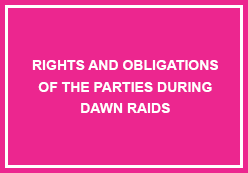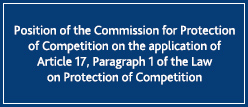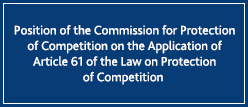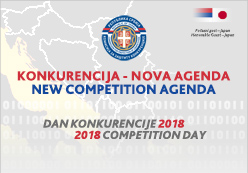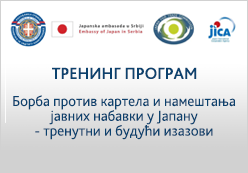International cooperation in the field of competition protection is one of the legal competences of the Commission for the Protection of Competition (hereinafter: the Commission) it achieves in order to fulfill international obligations in this area and through which it collects information on the protection of competition in other countries.
Achieving international cooperation also brings numerous indirect benefits for the Commission, such as the exchange of experiences, familiarization with the most current issues of competition protection worldwide and a comparative review of legal solutions, which can serve in the process of proposing regulations in the national legal order, constant education and raising the level of knowledge ( especially among younger staff), cooperation in practice, etc., all of which contribute to the harmonization of regulations and practices of competition protection authorities at the regional and European level, but also more widely, as well as to the efficient application of laws.
Through international cooperation, the development of competition protection law and policy in Serbia is presented and promoted, as well as the role of the Commission itself. The international professional public and the business community are introduced to the achieved standards in the functioning of the free market in Serbia and the achieved level of harmonization with the relevant EU acquis. A competitive and legally secure business environment, a recognizable competition protection regime and an operationally independent and efficient competition protection authority are of great importance for foreign investors.
The Commission implements international cooperation activities both on a bilateral basis and through participation in the work of international organizations, whereby both types of international cooperation of the Commission date back to the early days of its existence. Bilateral cooperation is achieved by the Commission mainly on the basis of memoranda of understanding or cooperation, the network of which gradually expanded, so that today the Commission has signed memoranda or agreements on cooperation with almost all authorities for the protection of competition of countries in the region of Southeast Europe.
PROJECT SUPPORT TO THE COMMISSION
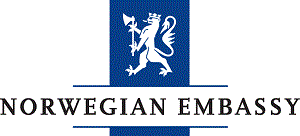 The Commission for Protection of Competition and the Embassy of the Kingdom of Norway in Belgrade signed the Grant Agreement funded by the Norwegian Ministry of Foreign Affairs for the implementation of project “Increasing economic growth through support to promotion of competition policy”.
The Commission for Protection of Competition and the Embassy of the Kingdom of Norway in Belgrade signed the Grant Agreement funded by the Norwegian Ministry of Foreign Affairs for the implementation of project “Increasing economic growth through support to promotion of competition policy”.
The Grant will be utilized for strengthening capacities of the Commission in implementing competition policy, while the planned effect is the advancement of its operating capacities and raising the level of awareness on the competition policy in Serbia.
The Project comprises of three segments which will be implemented through organizing promotions of solutions from the Draft Law on Protection of Competition with the objective of preparing a legislative proposal in as qualitative manner as possible, via increasing detection rate of competition infringements, as well as by raising the level of competition culture and awareness among key stakeholders in Serbia. The Agreement stipulates the project implementation period of 24 months, executed during 2018 and 2019.
In May 2017, the Norwegian Embassy in Belgrade published a call for submitting proposals for project “Strengthening EU integration in Serbia and Montenegro”. The overall goal of Norway’s assistance to the Western Balkans is to contribute to development of rule of law and stability through initiatives that promote stability, that is to say closer regional cooperation and implementation of transitional justice in the region, socio-economic development achieved through the increased economic growth and competitiveness, increased capacity in the field of environment, climate and energy, in addition to the increased social and economic inclusion of marginalized groups. The objectives of Norwegian assistance to the Western Balkans are also strengthening of the rule of law through capacity-building of courts, prosecuting authorities, independent control bodies and the police, a more democratic and effective defense sector, and also the fight against organized crime and corruption established as a top priority for the authorities.
This call of the Norwegian Embassy also aims to provide project-based support within the three priority areas of Norwegian development assistance to Ministries, local governments and public institutions participating in promoting and enhancing EU integration of Serbia and Montenegro. The proposed action must contribute to Serbian and Montenegrin EU integration process in one or more of the following chapters: Chapter 5: Public procurement; Chapter 8: Competition policy; Chapter 23: Judiciary and fundamental rights; Chapter 24: Justice, freedom and security; Chapter 27: Environment (for Montenegro only); Chapter 32: Financial control; and, Chapter 35: Other issues – Normalization of relations between Serbia and Kosovo (for Serbia only). The proposed activities must take place in Serbia and/or Montenegro.



